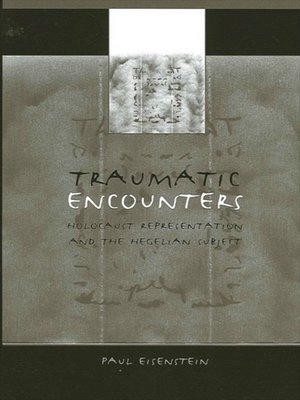
Sign up to save your library
With an OverDrive account, you can save your favorite libraries for at-a-glance information about availability. Find out more about OverDrive accounts.
Find this title in Libby, the library reading app by OverDrive.



Search for a digital library with this title
Title found at these libraries:
| Library Name | Distance |
|---|---|
| Loading... |
Addresses the difficulty of representing the Holocaust in literature and on film.
Traumatic Encounters argues for an alternative memorial path in Holocaust and cultural studies-one that shows the vital necessity of thinking in a universal way about an event like the Holocaust. Relying on Hegel's notion that the particular is already universal, Eisenstein shows how the encounter with trauma transpires not in the refusal of a universalizing gesture but rather in its wholesale embrace. This embrace results in a recognition involving the trauma that conditions the possibility of history in the first place-a structural trauma immune to historicization that Hegel and psychoanalysis place at the heart of subjectivity and community. This encounter with structural trauma is at the center of four titles that Eisenstein examines: Spielberg's Schindler's List, D. M. Thomas's The White Hotel, Thomas Mann's Doctor Faustus, and David Grossman's See Under: Love







